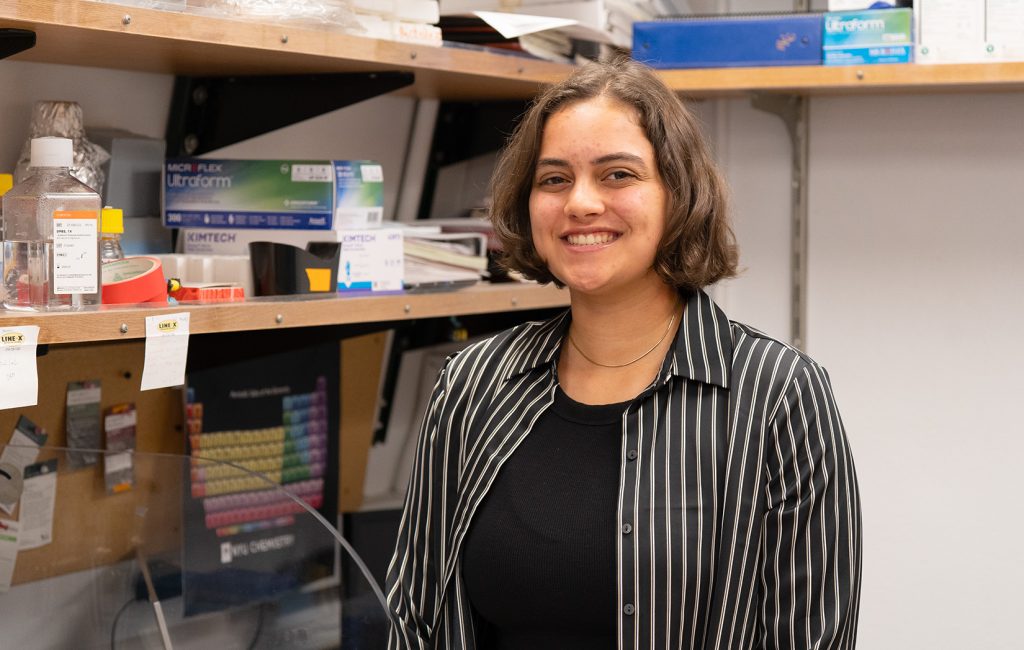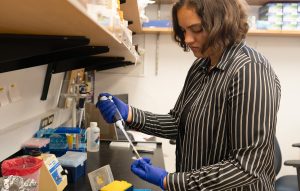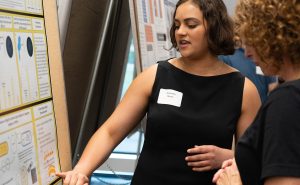
Story and photos by Logan Jackson
- Alexandra Renoe – sophomore biological sciences and physics double major
- Mentor: Pam Brown, associate professor of biological sciences; affiliate faculty in the Honors College
During her senior year of high school, Alexandra Renoe was on the lookout for an opportunity to get a jumpstart on her research career. A student at Hickman High School in Columbia, Missouri, Renoe decided to reach out to professors at the University of Missouri. She heard back from one professor – Pam Brown – and soon began working in the lab as a high school student.

Renoe will enter her sophomore year at Mizzou this fall and has continued to work with Brown, an associate professor of biological sciences and affiliate faculty in the Honors College. Renoe is conducting research throughout the summer, too, through the Cherng Summer Scholars program.
“It was really incredible to be able to be part of a collegiate lab as a high school student,” Renoe said. “My schedule allowed me to finish my schoolwork in the morning and head to Mizzou in the afternoon to participate in research. I have always known that I wanted to be a scientist, so this was a great opportunity, and I’m glad to still be working in this lab.”
Renoe’s research this summer is focused on studying two proteins within Agrobacterium tumefaciens, a bacterium that causes tumors in plants. Those two proteins are crucial for polar growth, which allows the cells to build the cell wall and elongate, and if either of the proteins are removed, Agrobacterium tumefaciens can’t grow.
“Agrobacterium tumefaciens causes Crown Gall disease,” Renoe said. “If you’ve seen large tumors on plants or trees, particularly fruit-bearing plants, that might be Crown Gall. It’s a disease that impacts stone fruit orchards and costs the agriculture industry millions of dollars each year because there is no cure. An improved understanding of Agrobacterium tumefaciens cell biology may lead to the rationale design of antimicrobial strategies to combat Crown Gall disease.”

Renoe said there are potential human health ties to her research, too. She’s hoping that she can take what she learns in the lab to help develop antibiotics for human diseases.
“This research is very motivating because I can see the impact of what I’m doing,” Renoe said. “Even though I work with these tiny proteins that can’t be seen by the human eye, I’m seeing the end result of my work with those molecules.”
Along with her project, Renoe said being part of the Cherng Summer Scholars program has given her the opportunity to connect with her peers. A nine-week research or creative scholarship program for Mizzou students who are pursuing the Honors Certificate, the Cherng Summer Scholars program allows students to participate in individually designed projects under the mentorship of a Mizzou faculty member. The program is supported by a gift from Peggy and Andrew Cherng and the Panda Charitable Foundation.
Students who are part of the program also enroll in a weekly seminar where they discuss various topics centered on their projects and research in general.
“Honestly, going to the class every week is one of my favorite parts of the week,” Renoe said. “The projects are all so different and wonderful, and I’ve learned so much through our conversations. I’ve really enjoyed seeing how each individual approaches their work.”